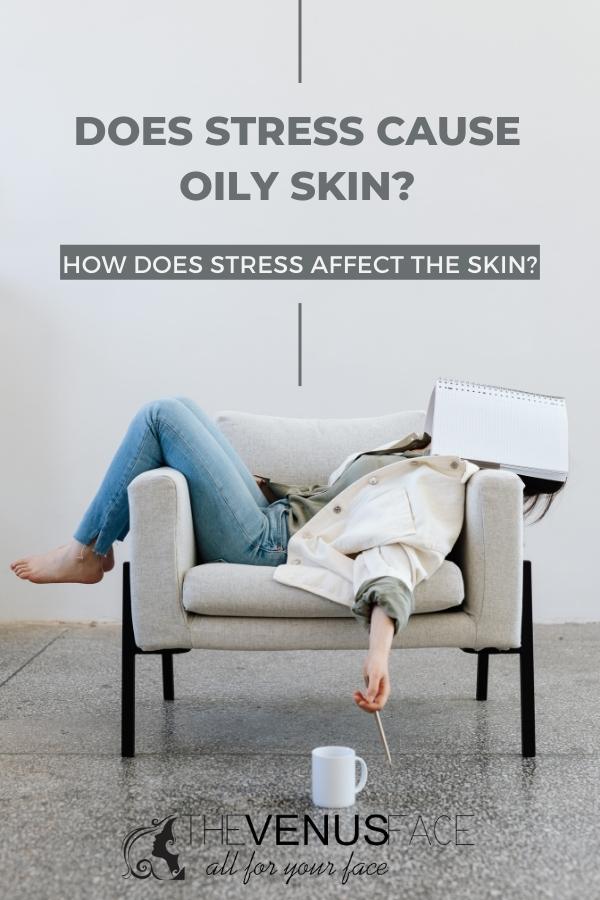Does stress cause oily skin? Learn about it in this blog post.
Oily skin is the result of an overproduction of sebum from the sebaceous glands. Sebum is a natural oil that helps to keep the skin hydrated and protected. However, when too much sebum is produced, it can cause the pores to become clogged, leading to a build-up of oil on the surface of the skin. Oily skin is often characterized by a shiny, greasy appearance and is more prone to breakouts. While it may be tempting to strip the skin of all its natural oils, this can actually make the problem worse by triggering the sebaceous glands to produce even more sebum.
Oily skin is a common problem that can be caused by a variety of factors: genetics, hormones, diet, and weather are all possible causes of oily skin. Many people with oily skin produce too much sebum, which is the natural oil that your skin produces to keep it healthy. When there is too much sebum, it can clog pores and lead to breakouts. Hormonal changes, such as during puberty or pregnancy, can also cause an increase in sebum production. Eating a diet high in processed foods and sugars can also trigger oily skin. Hot, humid weather can also cause your skin to produce more oil as your body tries to stay cool and hydrated.
There is 1 more reason causing oily skin that is usually neglected: stress.

Can stress cause oily skin?
Yes, it can. Many experiments have shown that psychological stress can lead to an increase in sebum production. Studies have shown that stress can activate the sebaceous glands and increase the production of sebum. Stress can also affect the way that sebum is metabolized, which can lead to an increase in oil on the skin. Some researches have also shown that happy people have less oily skin than people who are under a lot of stress.
More: How to Get Rid of Oily Skin: 14 Simple Yet Effective Practices
Why does stress cause oily skin?
When you are stressed, your body produces a hormone called cortisol. Cortisol can trigger the sebaceous glands to produce more sebum, which can lead to oily skin.
Cortisol is a hormone that is produced by the adrenal glands in response to stress. When cortisol levels are high, it can cause an increase in sebum production, which can lead to oily skin. High cortisol levels can further contribute to the development of acne. While there are many factors that can contribute to high cortisol levels, some lifestyle choices, such as not getting enough sleep or eating a diet high in sugar and processed foods, can make the problem worse.
More: Tips & Tricks to Combat Greasy Faces
How does stress affect the skin?
Stress can wreak havoc on your skin. When you’re stressed, your body produces cortisol, which leads to an overproduction of sebum, or oil. This can cause breakouts and make your skin more sensitive and reactive. Stress can also exacerbate existing inflammatory skin conditions, such as eczema, psoriasis, and rosacea. And if you’re someone who tends to pick at scabs or acne when you’re feeling nervous or anxious, stress can make those habits even worse. So if you’re looking to keep your skin looking its best, it’s important to manage your stress levels.
More: Can Wearing Glasses Cause Greasy Faces?
How to release stress?
Stress is not only bad for your mental health but for your physical health as well. You may experience headaches, neck pain, back pain, and other symptoms. Here are a few ways to help you release stress:
- Talk to someone you trust about what’s going on in your life.
- Exercise regularly.
- Practice yoga or meditation.
- Take a hot bath.
- Play with a pet.
- Listen to calming music.
- Read a book.
- Watch a funny movie or TV show.
- Take a walk outdoors.
- Write in a journal.
When it comes to mental health, it is not easy to just release the stress. You need to find what works best for you and make time for it in your day-to-day life. It is important to be patient and not expect results overnight. The key is to find a way to make releasing stress a habit so that it becomes part of your routine. Be comfortable with the uncomfortable.
More: Why Do I Have Greasy Skin After Surgery?
Final thought
It’s clear that stress can have a significant impact on our skin, both physically and emotionally. While there are many ways to release stress, it’s not always easy to do so. It takes time and patience to find what works best for you. Stress is a normal part of life, and there are many ways to cope with it. However, if you find that your stress levels are constantly high or that you’re struggling to manage your stress, it’s important to seek help from a qualified professional. There are many therapists and counselors who specialize in stress management, and they can help you develop healthy coping mechanisms. In addition, there are many online resources and support groups that can offer guidance and support. Remember, you don’t have to go through this alone. There are many people who want to help you manage your stress and live a happier, more fulfilling life.
More: Does Oily Skin Age Better? Do You Look Younger With Oily Face?
F.A.Q
Can stress and anxiety affect your skin?
Yes, it can. Stress and anxiety can lead to an overproduction of sebum, which can cause breakouts and make your skin more sensitive and reactive. It affects not only the skin but also other physical health.
Does stress change your face?
Yes, it does. Your face will look tired and older. The reason is that cortisol ( a stress hormone) will break down collagen which gives skin its elasticity. Moreover, it can make your face shiny and greasy as a result of increased sebum production.
Can stress give you acne?
Yes, it can. Stress hormones like cortisol stimulate the sebaceous glands and lead to over-production of sebum which can cause breakouts. In addition, stress can worsen pre-existing acne conditions.
References: https://www.nature.com/articles/s41574-019-0228-0


